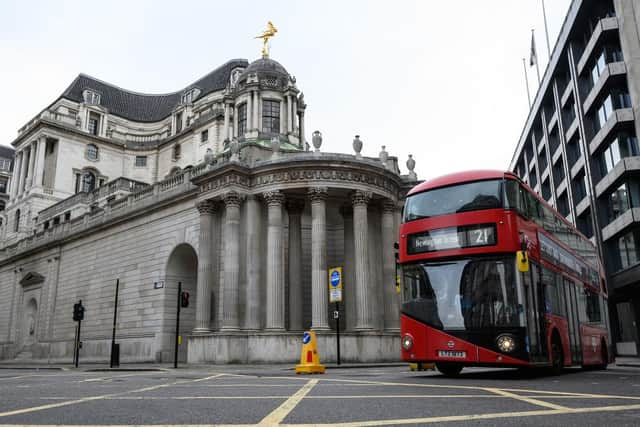New Covid variant impact expected to delay interest-rate rises
Thursday’s monetary policy committee (MPC) meeting will vote on whether to increase rates from the 0.1 per cent level they have been at since March 2020. In November, members voted 7-2 for no change in rates and 6-3 to leave quantitative easing unchanged. This week’s vote comes amid a flurry of economic announcements, including the latest inflation and unemployment figures.
Luke Bartholomew, senior economist at Edinburgh-headquartered investment group Abrdn, said he expects the Bank to keep policy on hold.
Advertisement
Hide AdAdvertisement
Hide Ad“This is a finely balanced call given the conflict between risk-management considerations versus the strong labour market data,” he said.


“Overall, we think the Bank will prefer to wait for more information on the severity of the variant and sustainability of restrictions before tightening policy at its February meeting.”
Mr Bartholomew still expects the bank rate to reach 50 basis points (bps) in May and 75bps by the end of 2022. “Despite the short-term hit to activity, if anything the risks are now skewed towards more hikes eventually being delivered as the supply impact of this shock may end up outweighing the demand impact, which would put further upward pressure on inflation.”
Danni Hewson, a financial analyst at AJ Bell, said that under normal circumstances, an environment where gross domestic product growth is expected to reach at least 6 per cent, inflation is running way ahead of the 2 per cent target and unemployment is just 4.3 per cent, an interest rate of 0.1 per cent “would make no sense whatsoever”.
She added: “Distortions to the data caused the pandemic, lockdowns and their ongoing effects upon consumer and corporate behaviour make policy-making harder, and for the moment the BoE seems more concerned about the danger posed by unemployment than it does about the danger posed by inflation.
“The US Federal Reserve, however, seems to be changing its tune and it will be interesting to see if the BoE does the same.”
Forecasts
In a poll of economists by Reuters, 25 expected the rate to be left unchanged next week, while 21 predicted a rise to 0.25 per cent. The previous month had seen a split, with 26 in favour of a hike versus 21 expecting no change.
This week will also see the release of other key data on the economy.
Advertisement
Hide AdAdvertisement
Hide AdThe Office for National Statistics will release the latest unemployment and wage growth figures. The latest numbers for the three months to September showed the employment rate was a historically high 75.1 per cent and wage growth was 5.8 per cent including bonuses.
On Wednesday, the latest inflation data for November will be released. The headline consumer price index rose 4.2 per cent year on year in October, the fastest increase since December 2011.
Ms Hewson said the relationship between unemployment, inflation and wage growth is a key one for consumers and one that the BoE needs to monitor and manage carefully, given that the UK is a consumption-led economy.
“If either unemployment or inflation starts to gallop higher, consumers quickly feel the pinch one way or the other, and, as such, central banks have a difficult balancing act.”
A message from the Editor:Thank you for reading this article. We’re more reliant on your support than ever as the shift in consumer habits brought about by coronavirus impacts our advertisers. If you haven’t already, please consider supporting our trusted, fact-checked journalism by taking out a digital subscription: www.scotsman.com/subscriptions
Comments
Want to join the conversation? Please or to comment on this article.
